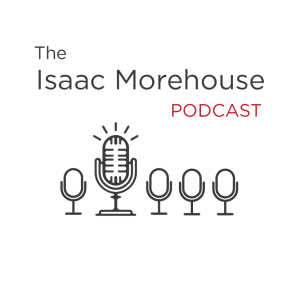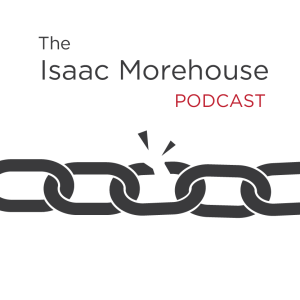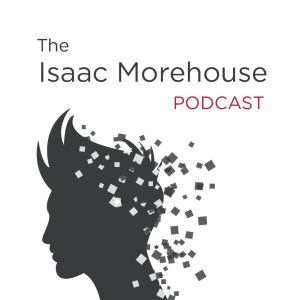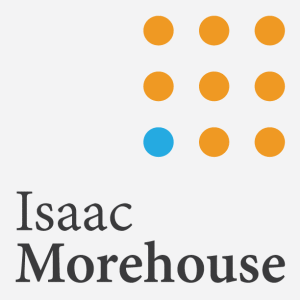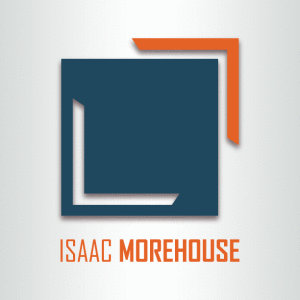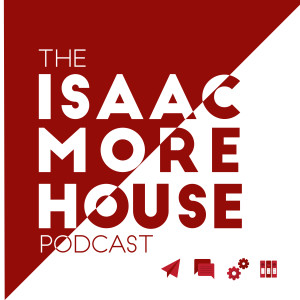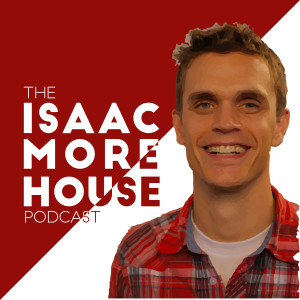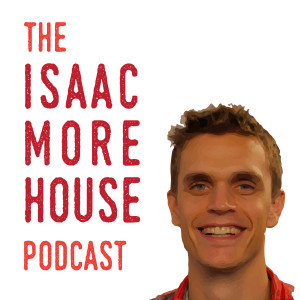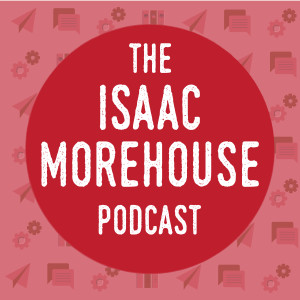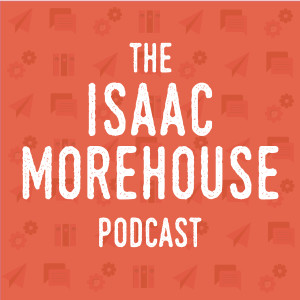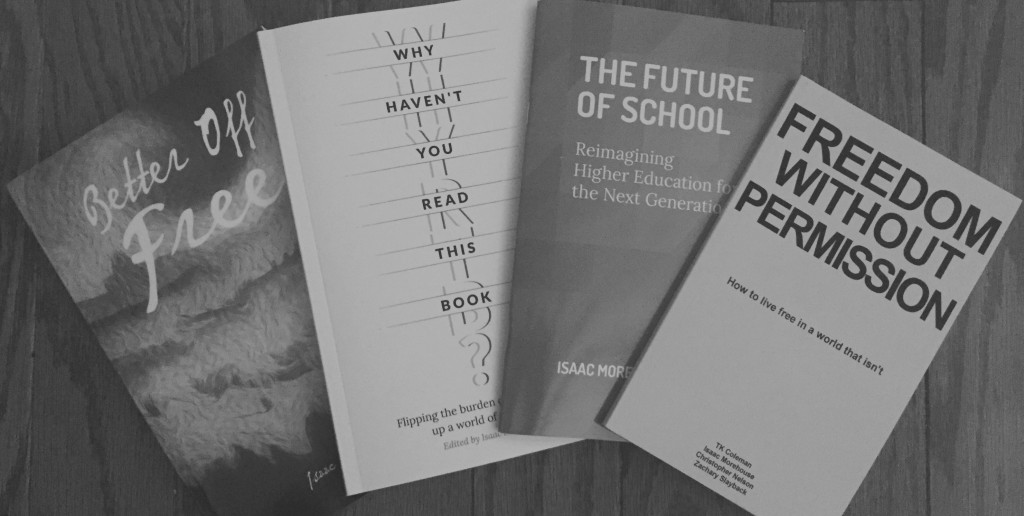Isaac’s Take: The Mind a Blender
It was cliché. I took a walk on the beach and my life changed forever.
I like to imagine ideas as tiny physical objects sloshing around in my skull. The heavier ones sink to the bottom and the rest separate based on weight and viscosity. They mostly find their resting place and stay put, or at least in the same stratum.
Yet in order to create, make personal progress, discover who we are, and do what makes us most alive we need ideas to bump into each other. We need more than prefabricated plans and processes. We need disparate concepts to pair in unlikely, unpredictable ways. We need ideas to not stay in their place.
The rhythmic jostling of a good walk is like a blender. All the layers of ideas begin to move and shake and mix and mash. Walking is like a stirring up of the brain and the soul. Just 20 minutes into a quiet walk and you’ll begin to notice weird things happening. Seemingly random thoughts and thoughts about thoughts will move up and down, side to side, from the back to the front of the mind.
Back to my story.
I was frustrated, restless, and in a rut. Even though it was inconvenient and disruptive to my busy day, I made myself drive 15 minutes to the beach and go for a walk. I needed that endless horizon. I had no specific goal for my walk, which is kind of the point.
Five minutes in and I looked up at the horizon and saw in my mind’s eye a word floating in all caps just above the water.
“PRAXIS”
The bouncing of my steps had shaken this word loose and on its way to the front of my mind it had bumped into a bunch of other ideas long dormant. My decade-long dissatisfaction with the higher education system. My personal knowledge of dozens of entrepreneurs who were hungry for young talent. Recognition of my own skillset and network. It was too perfect. How could I have failed to see this for so long?
Within minutes an entire business model came into view, crisp and clear. I ran to my car, drove home, sat at my laptop and typed for a few hours straight. What is now my business and my passion was born.
Looking back, it all makes sense. I disliked my own college experience and envisioned a radical new model some 12 years earlier. I didn’t know where to go next with my idea so I put it on the shelf and pursued other things. In the dozen years that followed, I mostly pursued whatever was interesting to me personally and professionally with no long term plans. I managed to accidentally accumulate a near perfect mix of knowledge, skill, experience, outlook, and a network to launch what eventually became the higher ed. alternative I once dreamed about.
But I didn’t know any of this stuff was in there. It was all hiding in its own layer. Some nestled deep in the subconscious. Some associated with entirely different aspects of myself. I could never have purposefully made the connections necessary to see what I was capable of building. It had to emerge.
I took a walk. It’s the best way I know of to create the space for emergence in your own life.
You live much of life on a conveyor belt. It’s a structure created by others beginning with school and following you even onto the Internet as your newsfeed is curated based on assumptions about what’s important to you. But you’re hatching ideas and ideas about ideas all the time, whether you know it or not. The trick is accessing them and giving them space to mingle.
All the networks and technology at our fingertips is amazing. But it cannot on its own bring about the great epiphanies and acts of creation.
You can’t deliberately plan emergence. But you can remove obstacles. You can create conditions conducive to it. For me, that’s the simple act of walking. An act as old as our species.
Let your steps stir up your soul.
T.K.’s Take: The Mind an Ocean
One of the concepts that radically changed my life is an idea called “noble boredom.”
According to Rabbi Jonathan Omer-Man noble boredom means, “No anticipation of action. It means having the ability to be present without needing something to happen.”
You don’t need to live very long to discover that busyness is the bearer of many luxuries. Being busy makes you look important. It gives you a good excuse for avoiding unwanted commitments and helps you deal with guilt, inadequacy, and the belief that you’re not working hard enough. Busyness protects from messy confrontations with the thing you fear the most: boredom.
When you consider the primary form of expressing boredom (“I don’t have anything to do”), it’s no wonder that we seek salvation in the experience of perpetual preoccupation. We dread running up against the fact that we often have no idea where we’re going and why we’re traveling in relation to all the stuff we do. If we stop being busy we’ll be bored. And if we become bored, we’ll see how uninteresting and uncreative our lives really are.
But inactivity need not be boring. The stillness and solitude that we look at as evidence of us not being creative enough is the very source of creativity.
Our subconscious mind is like the ocean. Our everyday waking-state consciousness is like the surface of that ocean. The activities of the mind and the external events that demand our attention are like the wind and the waves. Go to the shore of an ocean on a windy day and what do you see? You see the waves on the surface but what lies beneath is invisible.
The ocean is teeming with life, filled with all sorts of exotic and interesting forms waiting to be discovered. But as long as the wind is blowing and the waves are doing their dance such things remain hidden to the observer.
What if you return to the ocean on a quiet and calm day? The ocean doesn’t change but your experience of the ocean would be profoundly different. When the surface waters are still you see into the depths. You encounter astonishing things. You can reach for things that you previously didn’t know were there.
This is a metaphor for the relationship we have to our own interior depths. As much as we hail the marvelous powers of imagination, that power is often drowned out by all the external noise and busyness of day-to-day life. Our souls are not empty. They only seem to be because we haven’t learned how to look beyond the surface.
The simple act of taking a walk creates a bridge from busyness to stillness that allows us to penetrate the depths of our mind without completely disregarding our strongly conditioned need to “do something.” Some teachers of meditation describe walking as a mantra for the body. The purpose of a mantra is to get our reactive thinking and the incessant activities of the reptilian brain out of the way. It’s like giving a dog a bone. The dog ceases to make noise and it has something to do. This allows you to get on with your work.
Walking allows you to get into a rhythm or a groove that makes it easier for your reactive mind to settle down and open itself up to deeper insights and creative ideas. Many people try various forms of meditation only to find themselves uncomfortable, bored out of their minds, or quickly falling asleep. This is often the case because we’ve come to associate meditation with making the body still. The essence of meditating isn’t, however, about being in the lotus position or bragging about your ability to close your eyes and sit still for an hour. The true purpose of meditation is interior stillness.
You could say that walking is nature’s meditation hack. By involving your body in the act of meditation through casual walking you create a gentle transition to inner stillness. This kind of walking is different from the kind of walking you do when you’re trying to get somewhere. This is the walk of noble boredom. It’s a form of boredom because you’re not doing anything in the typical sense, yet it’s noble because this simple act of non-doing holds the promise of offering greater meaning, creativity, efficiency, and substance to all you do.
I’ve spent many years studying and practicing various forms of meditation. From Osho’s First & Last Freedom to Jean Houston’s The Possible Human, I’ve experimented with many different ways of exploring my own consciousness. All of the methods I’ve tried have been useful to some degree. As a student of philosophy, I love approaches to contemplation that emphasize the importance of taking a break from the world and sitting in silence. As an entrepreneur who enjoys the pressures and challenges of creative life, however, nothing has provided a better balance of satisfying both my need to relax and my impulse to be on the move than the fine art of walking.
When I played basketball in grade school my coach would often say “walk it off” in response to one of the players catching a leg cramp. That advice stills rings true. When I have a problem or puzzle I need to resolve, I walk it off. When my thinking is cramped, I walk it off. It’s never failed me yet.

